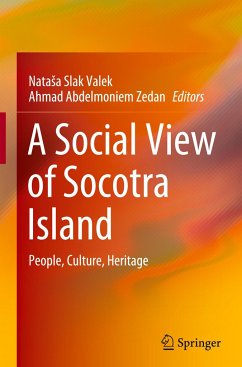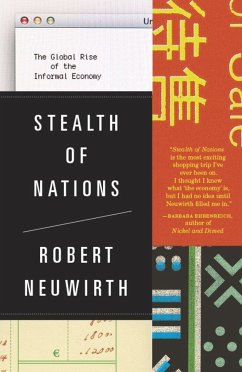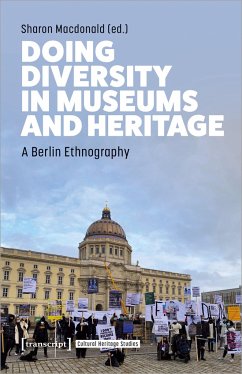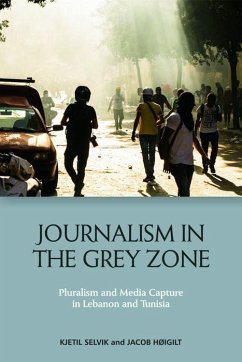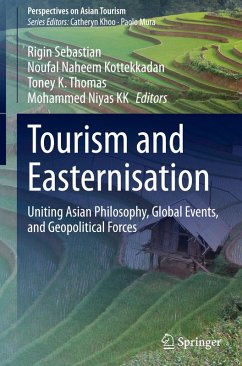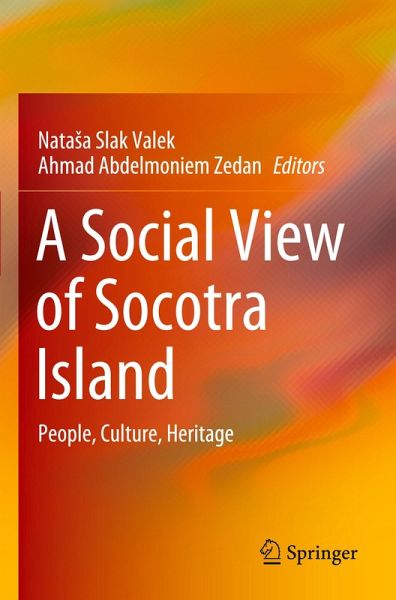
A Social View of Socotra Island
People, Culture, Heritage
Herausgegeben: Slak Valek, Natasa; Zedan, Ahmad Abdelmoniem
Versandkostenfrei!
Versandfertig in 6-10 Tagen
129,99 €
inkl. MwSt.

PAYBACK Punkte
65 °P sammeln!
This book focuses on Socotra Island, geographically based in Yemen, and aims to explore the island from the social sciences point of view. This book focuses on people indigenous to Socotra, Socotri cultures, heritage and also offers contributions from business, tourism, linguistic, communication, and anthropology. While a lot has been published in natural science about Socotra's endemic species, biodiversity, and nature in general, social scientific research of the island is very limited. This book addresses therefore addresses this gap and explores various topics of tourism, behaviours, cultu...
This book focuses on Socotra Island, geographically based in Yemen, and aims to explore the island from the social sciences point of view. This book focuses on people indigenous to Socotra, Socotri cultures, heritage and also offers contributions from business, tourism, linguistic, communication, and anthropology. While a lot has been published in natural science about Socotra's endemic species, biodiversity, and nature in general, social scientific research of the island is very limited. This book addresses therefore addresses this gap and explores various topics of tourism, behaviours, cultures, and language.
This book focuses on a clear social science approach of Socotra. The purpose of this book is to publish research about the people, behaviors, heritage, and potential tourism of Socotra. The Socotra Archipelago has long been a land of mystery. It is unknown as a tourism destination for many, however, is a popular destination for adventurers, photographers and travelers who like to travel to remote and undeveloped places. This book explains how Socotra has limited resources of electricity, which is provided by diesel generators, Internet is very slow and limited to certain points on the island. There are no shopping malls or five-star hotels. Roads, schools, and hospitals have been built only recently. This book shoes how these island people do not know the development as we do, which makes it principally interesting to research.
Previous interviewers of Socotri people about tourism development in the island have faced many challenges such as language barriers, lack of understanding the meanings and interviewing content, lack of support for the anticipated research results. This book successfully undertakes this challenge as not only in understanding the language, but understanding phenomena like e.g. tourism. Whilst acknowledging the ways in which indigenous island people have never travelled orseen a developed city. Thus, words like 'developed', 'tourism destination' or 'washing machine' may be unfamiliar terms for them. Therefore, new and innovative research methods that are sensitive to Socotra people were implemented in the creation of this book.
This book focuses on a clear social science approach of Socotra. The purpose of this book is to publish research about the people, behaviors, heritage, and potential tourism of Socotra. The Socotra Archipelago has long been a land of mystery. It is unknown as a tourism destination for many, however, is a popular destination for adventurers, photographers and travelers who like to travel to remote and undeveloped places. This book explains how Socotra has limited resources of electricity, which is provided by diesel generators, Internet is very slow and limited to certain points on the island. There are no shopping malls or five-star hotels. Roads, schools, and hospitals have been built only recently. This book shoes how these island people do not know the development as we do, which makes it principally interesting to research.
Previous interviewers of Socotri people about tourism development in the island have faced many challenges such as language barriers, lack of understanding the meanings and interviewing content, lack of support for the anticipated research results. This book successfully undertakes this challenge as not only in understanding the language, but understanding phenomena like e.g. tourism. Whilst acknowledging the ways in which indigenous island people have never travelled orseen a developed city. Thus, words like 'developed', 'tourism destination' or 'washing machine' may be unfamiliar terms for them. Therefore, new and innovative research methods that are sensitive to Socotra people were implemented in the creation of this book.



